Hospitality Marketing and Operations Management
VerifiedAdded on 2020/10/04
|14
|4425
|294
AI Summary
The assignment provided is a research paper that focuses on the topic of hospitality marketing and operations management. It discusses various aspects of hospitality services and product nature, as well as the profile of customers with differing expectations and needs. The document references multiple books and journals related to hospitality marketing and operations management. It also explores environmental management research in hospitality, world-class manufacturing by Fiat compared to Toyota production system, food and beverage management, structural and infrastructural decisions of operations management in the hotel sector, progress on information and communication technologies in hospitality and tourism, sport facility operations management, and conducting systematic literature reviews in operations management.
Contribute Materials
Your contribution can guide someone’s learning journey. Share your
documents today.
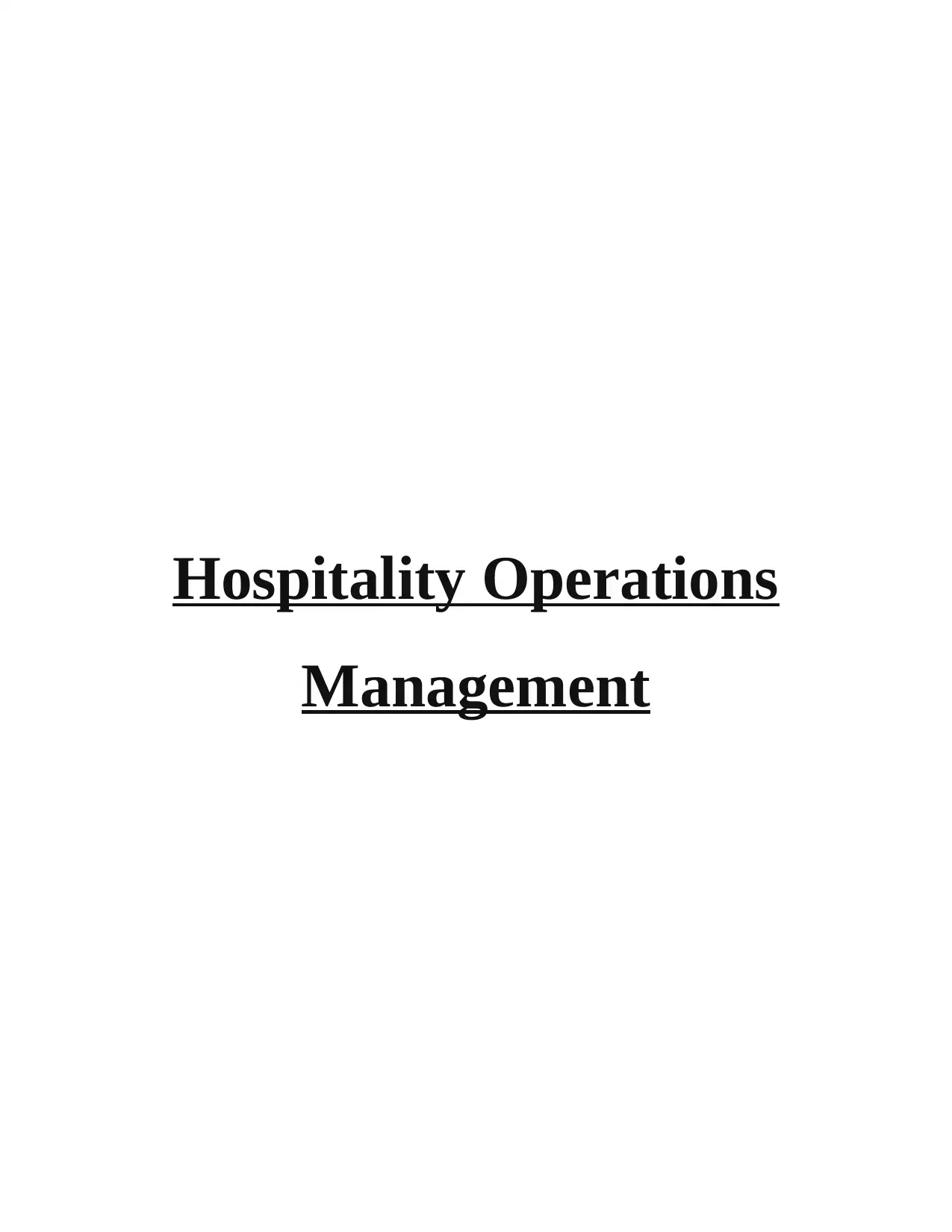
Hospitality Operations
Management
Management
Secure Best Marks with AI Grader
Need help grading? Try our AI Grader for instant feedback on your assignments.
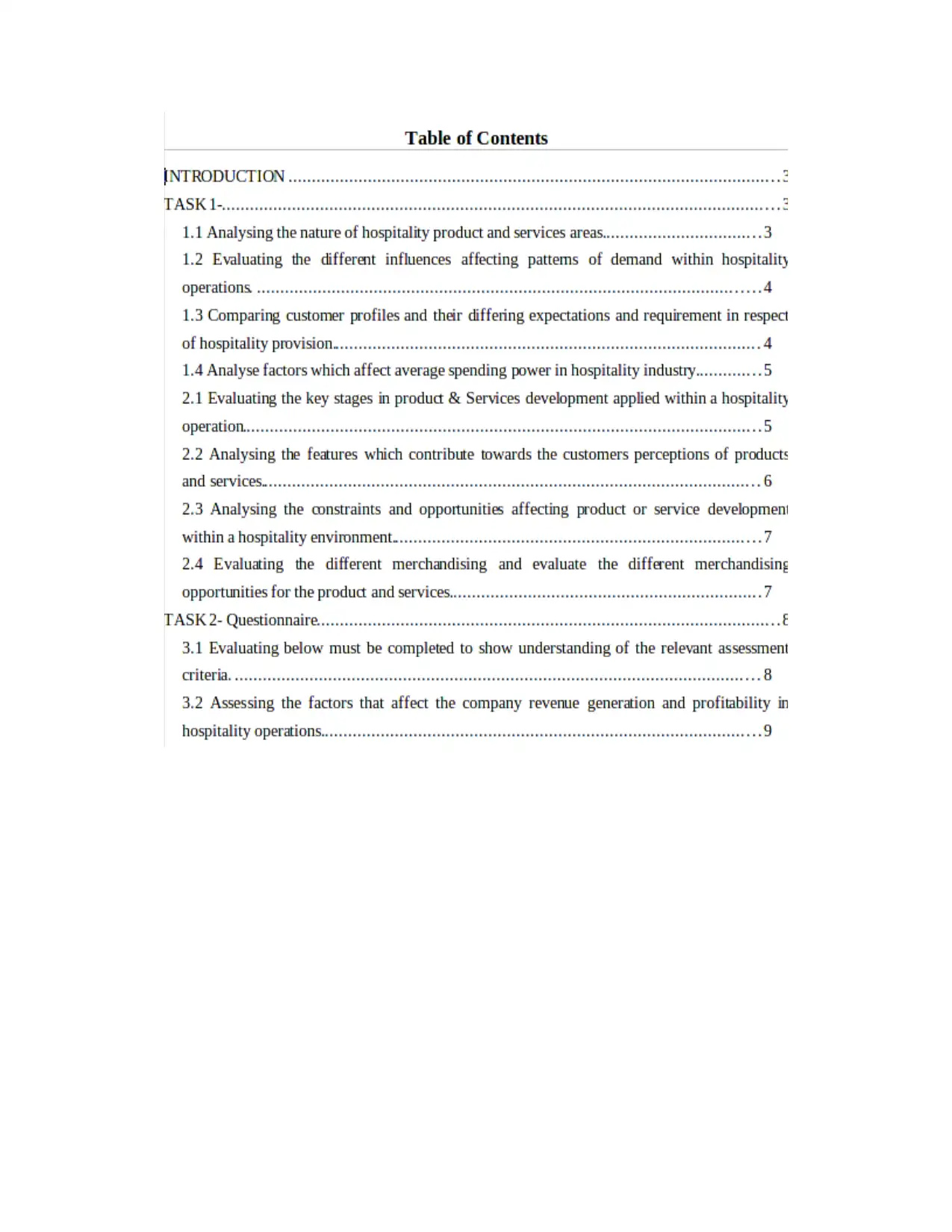
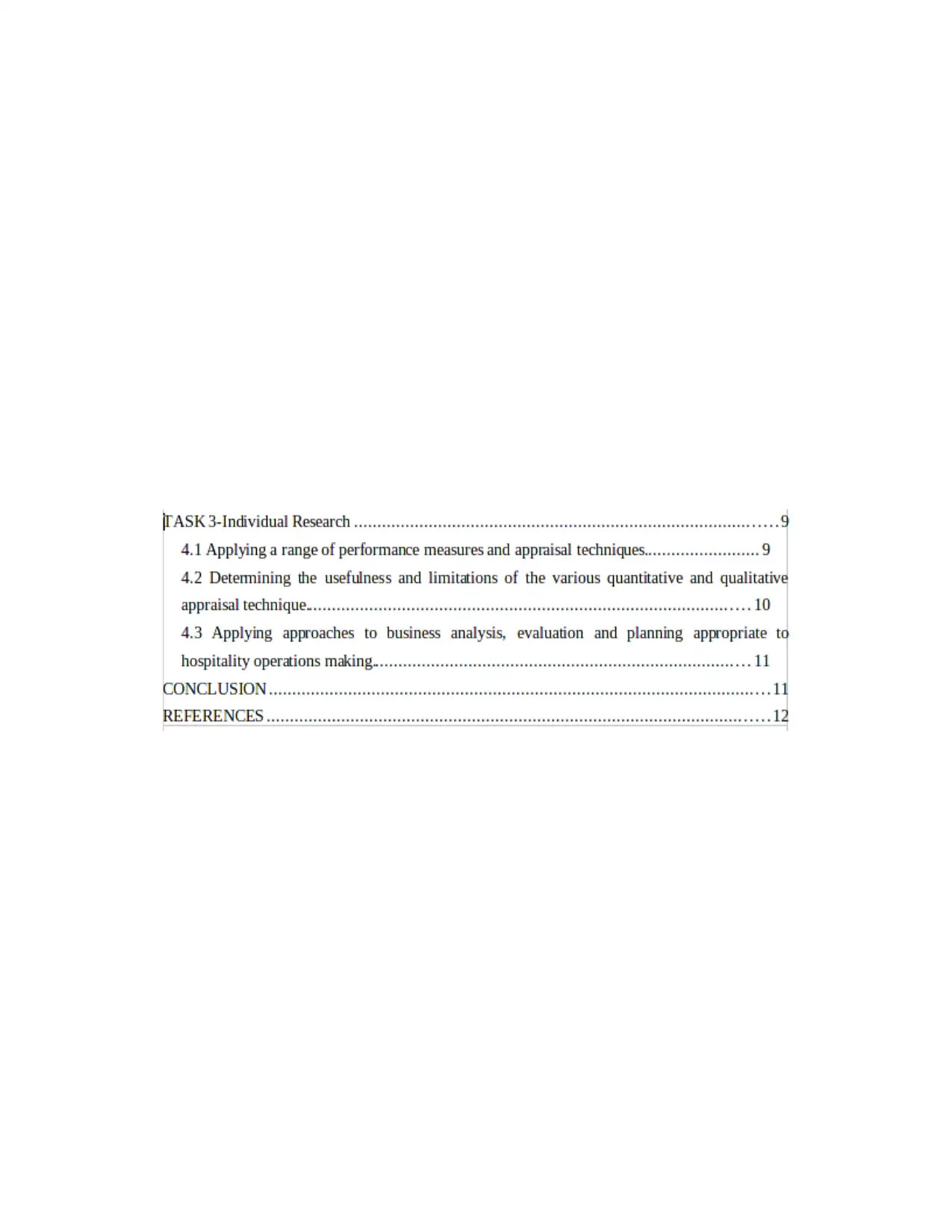
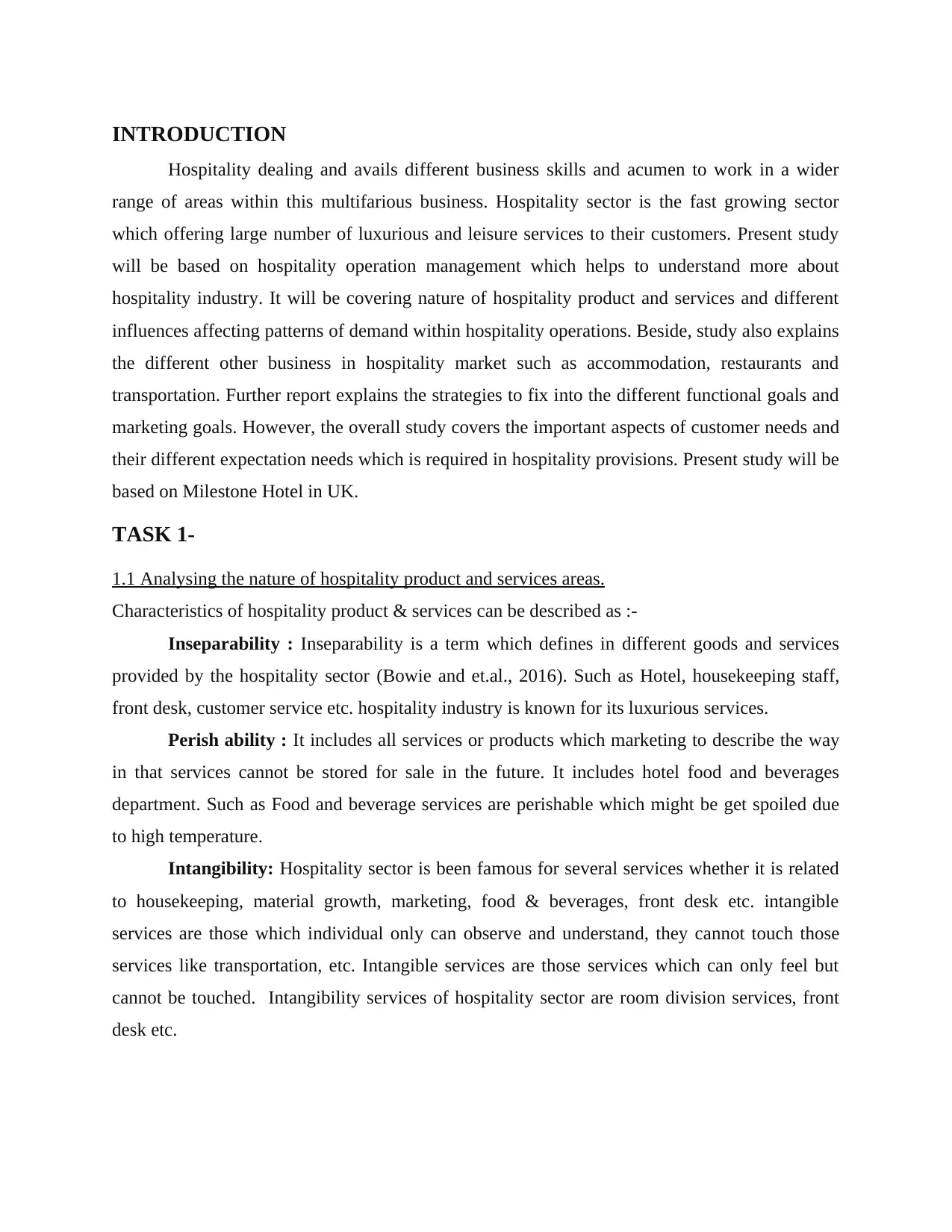
INTRODUCTION
Hospitality dealing and avails different business skills and acumen to work in a wider
range of areas within this multifarious business. Hospitality sector is the fast growing sector
which offering large number of luxurious and leisure services to their customers. Present study
will be based on hospitality operation management which helps to understand more about
hospitality industry. It will be covering nature of hospitality product and services and different
influences affecting patterns of demand within hospitality operations. Beside, study also explains
the different other business in hospitality market such as accommodation, restaurants and
transportation. Further report explains the strategies to fix into the different functional goals and
marketing goals. However, the overall study covers the important aspects of customer needs and
their different expectation needs which is required in hospitality provisions. Present study will be
based on Milestone Hotel in UK.
TASK 1-
1.1 Analysing the nature of hospitality product and services areas.
Characteristics of hospitality product & services can be described as :-
Inseparability : Inseparability is a term which defines in different goods and services
provided by the hospitality sector (Bowie and et.al., 2016). Such as Hotel, housekeeping staff,
front desk, customer service etc. hospitality industry is known for its luxurious services.
Perish ability : It includes all services or products which marketing to describe the way
in that services cannot be stored for sale in the future. It includes hotel food and beverages
department. Such as Food and beverage services are perishable which might be get spoiled due
to high temperature.
Intangibility: Hospitality sector is been famous for several services whether it is related
to housekeeping, material growth, marketing, food & beverages, front desk etc. intangible
services are those which individual only can observe and understand, they cannot touch those
services like transportation, etc. Intangible services are those services which can only feel but
cannot be touched. Intangibility services of hospitality sector are room division services, front
desk etc.
Hospitality dealing and avails different business skills and acumen to work in a wider
range of areas within this multifarious business. Hospitality sector is the fast growing sector
which offering large number of luxurious and leisure services to their customers. Present study
will be based on hospitality operation management which helps to understand more about
hospitality industry. It will be covering nature of hospitality product and services and different
influences affecting patterns of demand within hospitality operations. Beside, study also explains
the different other business in hospitality market such as accommodation, restaurants and
transportation. Further report explains the strategies to fix into the different functional goals and
marketing goals. However, the overall study covers the important aspects of customer needs and
their different expectation needs which is required in hospitality provisions. Present study will be
based on Milestone Hotel in UK.
TASK 1-
1.1 Analysing the nature of hospitality product and services areas.
Characteristics of hospitality product & services can be described as :-
Inseparability : Inseparability is a term which defines in different goods and services
provided by the hospitality sector (Bowie and et.al., 2016). Such as Hotel, housekeeping staff,
front desk, customer service etc. hospitality industry is known for its luxurious services.
Perish ability : It includes all services or products which marketing to describe the way
in that services cannot be stored for sale in the future. It includes hotel food and beverages
department. Such as Food and beverage services are perishable which might be get spoiled due
to high temperature.
Intangibility: Hospitality sector is been famous for several services whether it is related
to housekeeping, material growth, marketing, food & beverages, front desk etc. intangible
services are those which individual only can observe and understand, they cannot touch those
services like transportation, etc. Intangible services are those services which can only feel but
cannot be touched. Intangibility services of hospitality sector are room division services, front
desk etc.
Secure Best Marks with AI Grader
Need help grading? Try our AI Grader for instant feedback on your assignments.
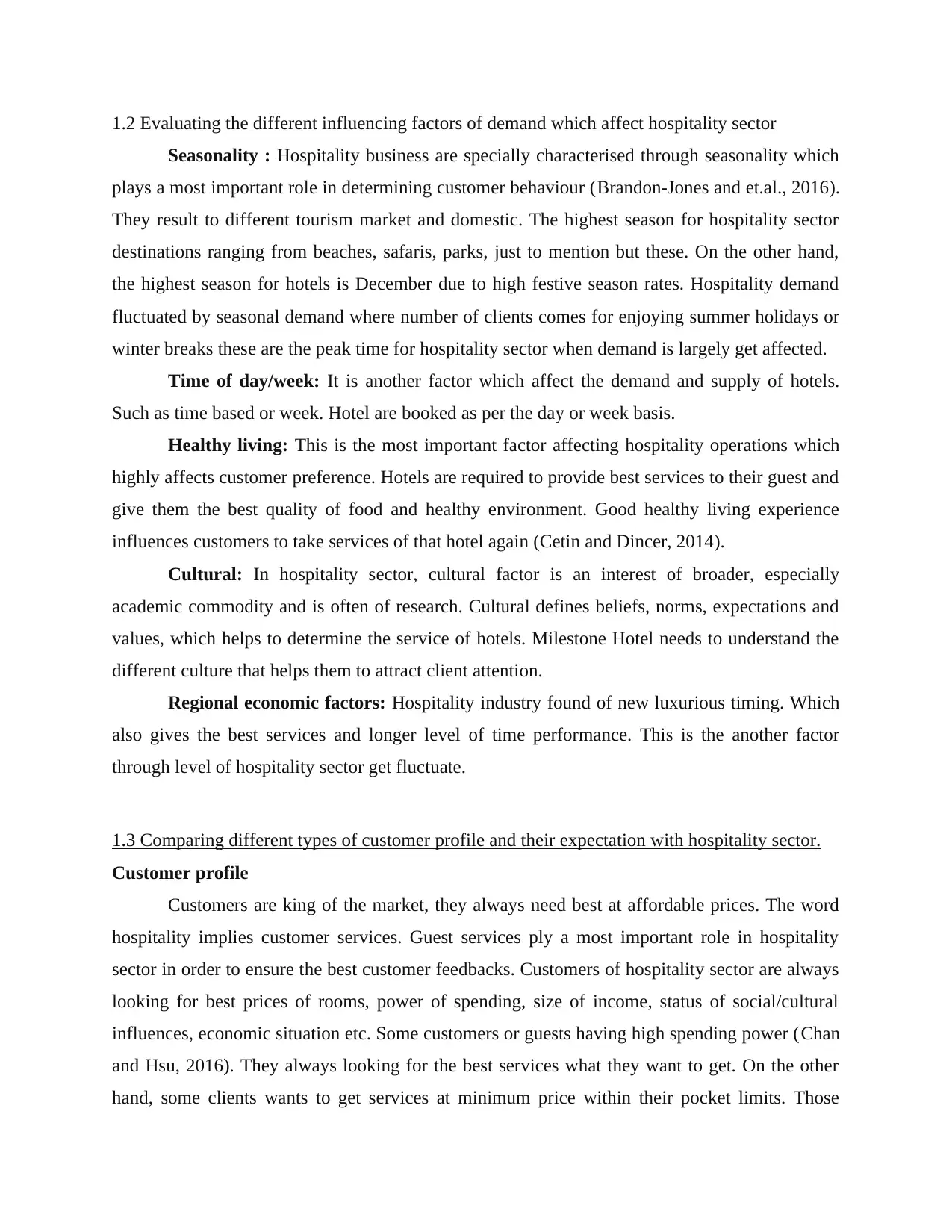
1.2 Evaluating the different influencing factors of demand which affect hospitality sector
Seasonality : Hospitality business are specially characterised through seasonality which
plays a most important role in determining customer behaviour (Brandon-Jones and et.al., 2016).
They result to different tourism market and domestic. The highest season for hospitality sector
destinations ranging from beaches, safaris, parks, just to mention but these. On the other hand,
the highest season for hotels is December due to high festive season rates. Hospitality demand
fluctuated by seasonal demand where number of clients comes for enjoying summer holidays or
winter breaks these are the peak time for hospitality sector when demand is largely get affected.
Time of day/week: It is another factor which affect the demand and supply of hotels.
Such as time based or week. Hotel are booked as per the day or week basis.
Healthy living: This is the most important factor affecting hospitality operations which
highly affects customer preference. Hotels are required to provide best services to their guest and
give them the best quality of food and healthy environment. Good healthy living experience
influences customers to take services of that hotel again (Cetin and Dincer, 2014).
Cultural: In hospitality sector, cultural factor is an interest of broader, especially
academic commodity and is often of research. Cultural defines beliefs, norms, expectations and
values, which helps to determine the service of hotels. Milestone Hotel needs to understand the
different culture that helps them to attract client attention.
Regional economic factors: Hospitality industry found of new luxurious timing. Which
also gives the best services and longer level of time performance. This is the another factor
through level of hospitality sector get fluctuate.
1.3 Comparing different types of customer profile and their expectation with hospitality sector.
Customer profile
Customers are king of the market, they always need best at affordable prices. The word
hospitality implies customer services. Guest services ply a most important role in hospitality
sector in order to ensure the best customer feedbacks. Customers of hospitality sector are always
looking for best prices of rooms, power of spending, size of income, status of social/cultural
influences, economic situation etc. Some customers or guests having high spending power (Chan
and Hsu, 2016). They always looking for the best services what they want to get. On the other
hand, some clients wants to get services at minimum price within their pocket limits. Those
Seasonality : Hospitality business are specially characterised through seasonality which
plays a most important role in determining customer behaviour (Brandon-Jones and et.al., 2016).
They result to different tourism market and domestic. The highest season for hospitality sector
destinations ranging from beaches, safaris, parks, just to mention but these. On the other hand,
the highest season for hotels is December due to high festive season rates. Hospitality demand
fluctuated by seasonal demand where number of clients comes for enjoying summer holidays or
winter breaks these are the peak time for hospitality sector when demand is largely get affected.
Time of day/week: It is another factor which affect the demand and supply of hotels.
Such as time based or week. Hotel are booked as per the day or week basis.
Healthy living: This is the most important factor affecting hospitality operations which
highly affects customer preference. Hotels are required to provide best services to their guest and
give them the best quality of food and healthy environment. Good healthy living experience
influences customers to take services of that hotel again (Cetin and Dincer, 2014).
Cultural: In hospitality sector, cultural factor is an interest of broader, especially
academic commodity and is often of research. Cultural defines beliefs, norms, expectations and
values, which helps to determine the service of hotels. Milestone Hotel needs to understand the
different culture that helps them to attract client attention.
Regional economic factors: Hospitality industry found of new luxurious timing. Which
also gives the best services and longer level of time performance. This is the another factor
through level of hospitality sector get fluctuate.
1.3 Comparing different types of customer profile and their expectation with hospitality sector.
Customer profile
Customers are king of the market, they always need best at affordable prices. The word
hospitality implies customer services. Guest services ply a most important role in hospitality
sector in order to ensure the best customer feedbacks. Customers of hospitality sector are always
looking for best prices of rooms, power of spending, size of income, status of social/cultural
influences, economic situation etc. Some customers or guests having high spending power (Chan
and Hsu, 2016). They always looking for the best services what they want to get. On the other
hand, some clients wants to get services at minimum price within their pocket limits. Those
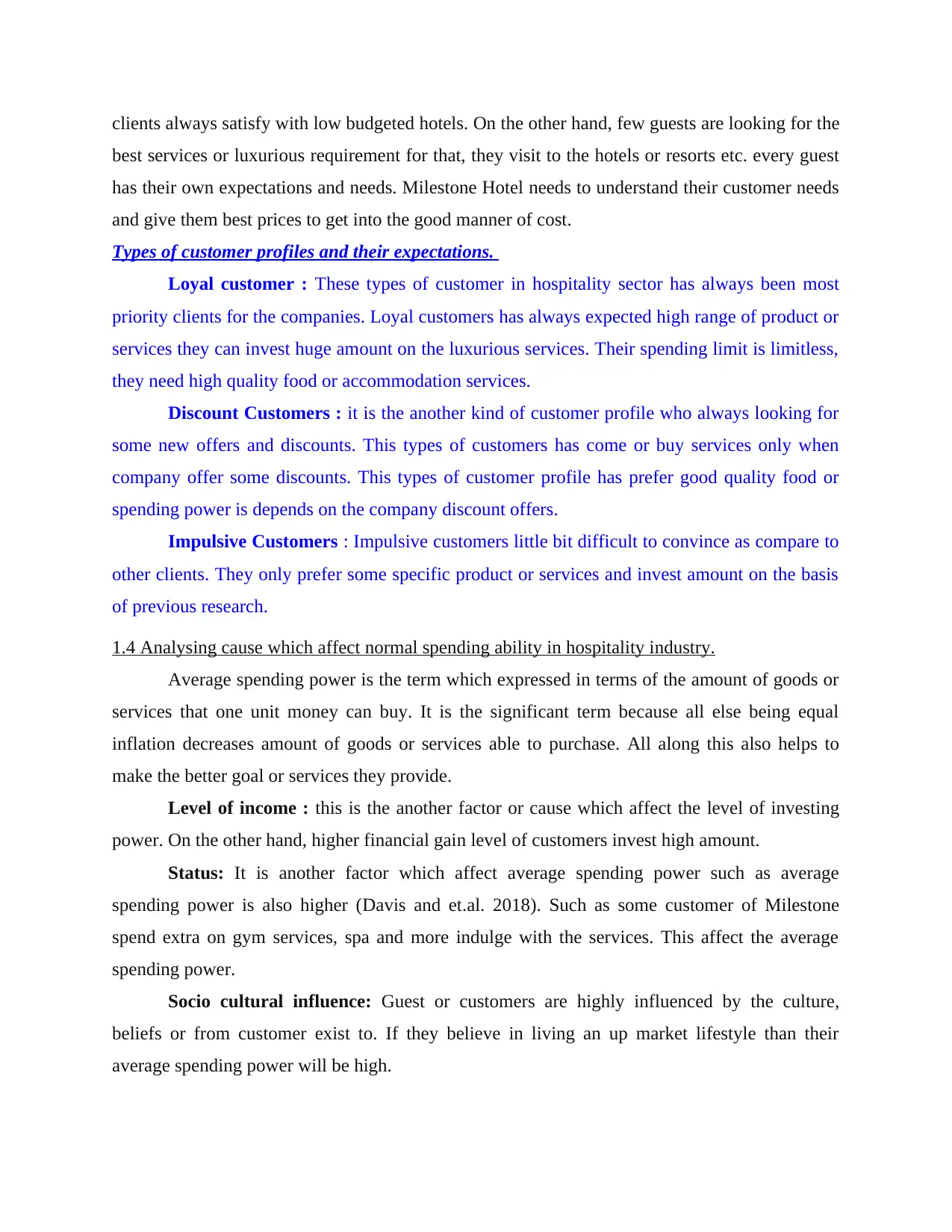
clients always satisfy with low budgeted hotels. On the other hand, few guests are looking for the
best services or luxurious requirement for that, they visit to the hotels or resorts etc. every guest
has their own expectations and needs. Milestone Hotel needs to understand their customer needs
and give them best prices to get into the good manner of cost.
Types of customer profiles and their expectations.
Loyal customer : These types of customer in hospitality sector has always been most
priority clients for the companies. Loyal customers has always expected high range of product or
services they can invest huge amount on the luxurious services. Their spending limit is limitless,
they need high quality food or accommodation services.
Discount Customers : it is the another kind of customer profile who always looking for
some new offers and discounts. This types of customers has come or buy services only when
company offer some discounts. This types of customer profile has prefer good quality food or
spending power is depends on the company discount offers.
Impulsive Customers : Impulsive customers little bit difficult to convince as compare to
other clients. They only prefer some specific product or services and invest amount on the basis
of previous research.
1.4 Analysing cause which affect normal spending ability in hospitality industry.
Average spending power is the term which expressed in terms of the amount of goods or
services that one unit money can buy. It is the significant term because all else being equal
inflation decreases amount of goods or services able to purchase. All along this also helps to
make the better goal or services they provide.
Level of income : this is the another factor or cause which affect the level of investing
power. On the other hand, higher financial gain level of customers invest high amount.
Status: It is another factor which affect average spending power such as average
spending power is also higher (Davis and et.al. 2018). Such as some customer of Milestone
spend extra on gym services, spa and more indulge with the services. This affect the average
spending power.
Socio cultural influence: Guest or customers are highly influenced by the culture,
beliefs or from customer exist to. If they believe in living an up market lifestyle than their
average spending power will be high.
best services or luxurious requirement for that, they visit to the hotels or resorts etc. every guest
has their own expectations and needs. Milestone Hotel needs to understand their customer needs
and give them best prices to get into the good manner of cost.
Types of customer profiles and their expectations.
Loyal customer : These types of customer in hospitality sector has always been most
priority clients for the companies. Loyal customers has always expected high range of product or
services they can invest huge amount on the luxurious services. Their spending limit is limitless,
they need high quality food or accommodation services.
Discount Customers : it is the another kind of customer profile who always looking for
some new offers and discounts. This types of customers has come or buy services only when
company offer some discounts. This types of customer profile has prefer good quality food or
spending power is depends on the company discount offers.
Impulsive Customers : Impulsive customers little bit difficult to convince as compare to
other clients. They only prefer some specific product or services and invest amount on the basis
of previous research.
1.4 Analysing cause which affect normal spending ability in hospitality industry.
Average spending power is the term which expressed in terms of the amount of goods or
services that one unit money can buy. It is the significant term because all else being equal
inflation decreases amount of goods or services able to purchase. All along this also helps to
make the better goal or services they provide.
Level of income : this is the another factor or cause which affect the level of investing
power. On the other hand, higher financial gain level of customers invest high amount.
Status: It is another factor which affect average spending power such as average
spending power is also higher (Davis and et.al. 2018). Such as some customer of Milestone
spend extra on gym services, spa and more indulge with the services. This affect the average
spending power.
Socio cultural influence: Guest or customers are highly influenced by the culture,
beliefs or from customer exist to. If they believe in living an up market lifestyle than their
average spending power will be high.
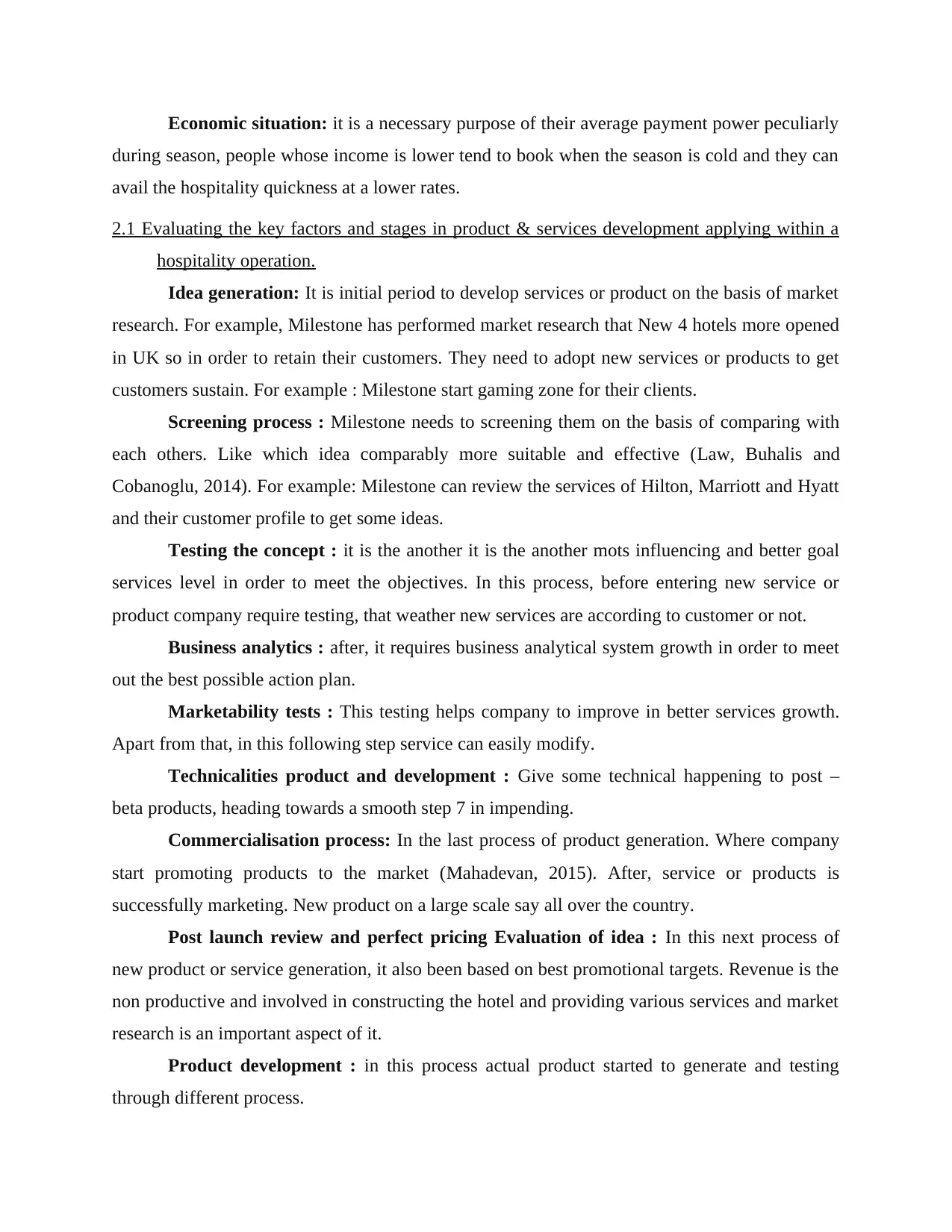
Economic situation: it is a necessary purpose of their average payment power peculiarly
during season, people whose income is lower tend to book when the season is cold and they can
avail the hospitality quickness at a lower rates.
2.1 Evaluating the key factors and stages in product & services development applying within a
hospitality operation.
Idea generation: It is initial period to develop services or product on the basis of market
research. For example, Milestone has performed market research that New 4 hotels more opened
in UK so in order to retain their customers. They need to adopt new services or products to get
customers sustain. For example : Milestone start gaming zone for their clients.
Screening process : Milestone needs to screening them on the basis of comparing with
each others. Like which idea comparably more suitable and effective (Law, Buhalis and
Cobanoglu, 2014). For example: Milestone can review the services of Hilton, Marriott and Hyatt
and their customer profile to get some ideas.
Testing the concept : it is the another it is the another mots influencing and better goal
services level in order to meet the objectives. In this process, before entering new service or
product company require testing, that weather new services are according to customer or not.
Business analytics : after, it requires business analytical system growth in order to meet
out the best possible action plan.
Marketability tests : This testing helps company to improve in better services growth.
Apart from that, in this following step service can easily modify.
Technicalities product and development : Give some technical happening to post –
beta products, heading towards a smooth step 7 in impending.
Commercialisation process: In the last process of product generation. Where company
start promoting products to the market (Mahadevan, 2015). After, service or products is
successfully marketing. New product on a large scale say all over the country.
Post launch review and perfect pricing Evaluation of idea : In this next process of
new product or service generation, it also been based on best promotional targets. Revenue is the
non productive and involved in constructing the hotel and providing various services and market
research is an important aspect of it.
Product development : in this process actual product started to generate and testing
through different process.
during season, people whose income is lower tend to book when the season is cold and they can
avail the hospitality quickness at a lower rates.
2.1 Evaluating the key factors and stages in product & services development applying within a
hospitality operation.
Idea generation: It is initial period to develop services or product on the basis of market
research. For example, Milestone has performed market research that New 4 hotels more opened
in UK so in order to retain their customers. They need to adopt new services or products to get
customers sustain. For example : Milestone start gaming zone for their clients.
Screening process : Milestone needs to screening them on the basis of comparing with
each others. Like which idea comparably more suitable and effective (Law, Buhalis and
Cobanoglu, 2014). For example: Milestone can review the services of Hilton, Marriott and Hyatt
and their customer profile to get some ideas.
Testing the concept : it is the another it is the another mots influencing and better goal
services level in order to meet the objectives. In this process, before entering new service or
product company require testing, that weather new services are according to customer or not.
Business analytics : after, it requires business analytical system growth in order to meet
out the best possible action plan.
Marketability tests : This testing helps company to improve in better services growth.
Apart from that, in this following step service can easily modify.
Technicalities product and development : Give some technical happening to post –
beta products, heading towards a smooth step 7 in impending.
Commercialisation process: In the last process of product generation. Where company
start promoting products to the market (Mahadevan, 2015). After, service or products is
successfully marketing. New product on a large scale say all over the country.
Post launch review and perfect pricing Evaluation of idea : In this next process of
new product or service generation, it also been based on best promotional targets. Revenue is the
non productive and involved in constructing the hotel and providing various services and market
research is an important aspect of it.
Product development : in this process actual product started to generate and testing
through different process.
Paraphrase This Document
Need a fresh take? Get an instant paraphrase of this document with our AI Paraphraser
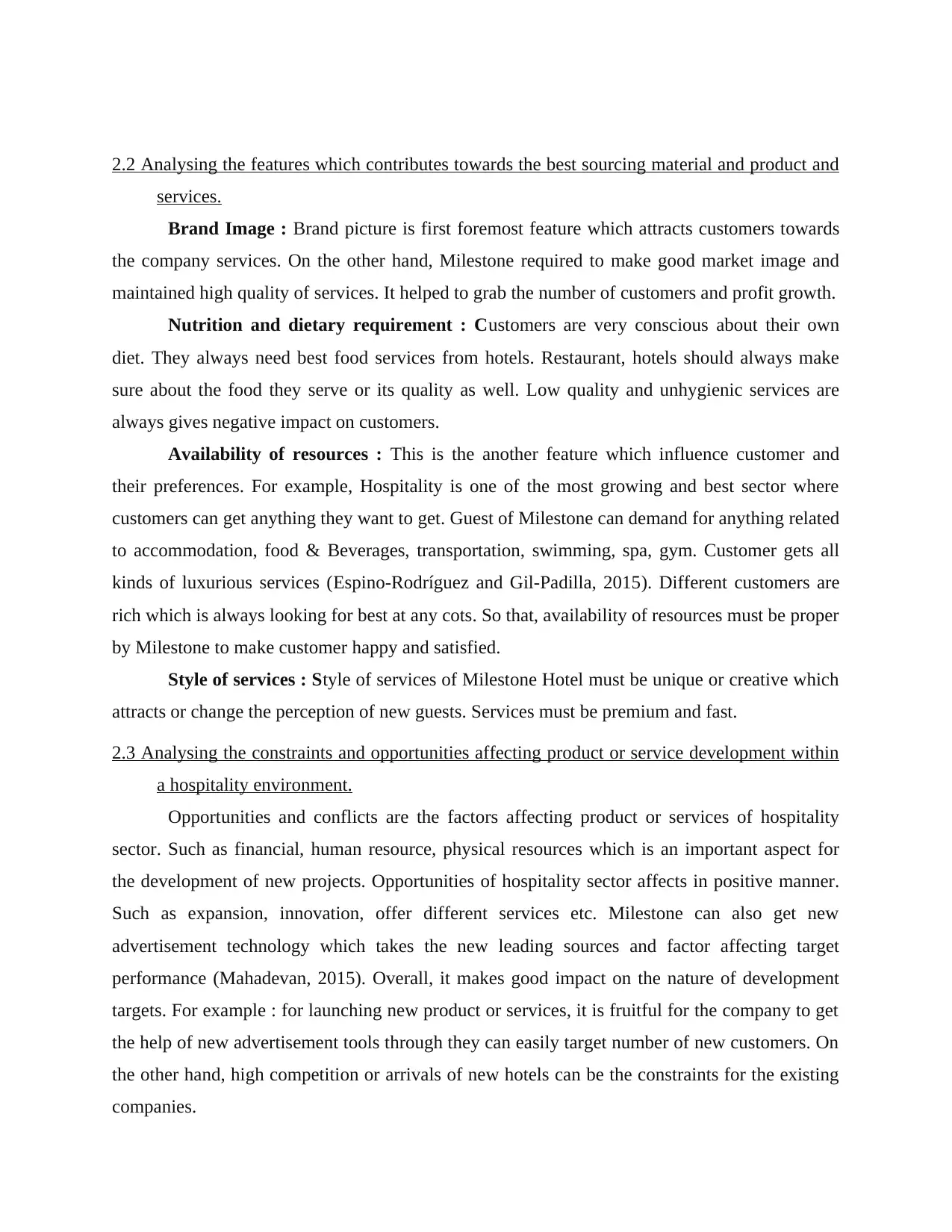
2.2 Analysing the features which contributes towards the best sourcing material and product and
services.
Brand Image : Brand picture is first foremost feature which attracts customers towards
the company services. On the other hand, Milestone required to make good market image and
maintained high quality of services. It helped to grab the number of customers and profit growth.
Nutrition and dietary requirement : Customers are very conscious about their own
diet. They always need best food services from hotels. Restaurant, hotels should always make
sure about the food they serve or its quality as well. Low quality and unhygienic services are
always gives negative impact on customers.
Availability of resources : This is the another feature which influence customer and
their preferences. For example, Hospitality is one of the most growing and best sector where
customers can get anything they want to get. Guest of Milestone can demand for anything related
to accommodation, food & Beverages, transportation, swimming, spa, gym. Customer gets all
kinds of luxurious services (Espino-Rodríguez and Gil-Padilla, 2015). Different customers are
rich which is always looking for best at any cots. So that, availability of resources must be proper
by Milestone to make customer happy and satisfied.
Style of services : Style of services of Milestone Hotel must be unique or creative which
attracts or change the perception of new guests. Services must be premium and fast.
2.3 Analysing the constraints and opportunities affecting product or service development within
a hospitality environment.
Opportunities and conflicts are the factors affecting product or services of hospitality
sector. Such as financial, human resource, physical resources which is an important aspect for
the development of new projects. Opportunities of hospitality sector affects in positive manner.
Such as expansion, innovation, offer different services etc. Milestone can also get new
advertisement technology which takes the new leading sources and factor affecting target
performance (Mahadevan, 2015). Overall, it makes good impact on the nature of development
targets. For example : for launching new product or services, it is fruitful for the company to get
the help of new advertisement tools through they can easily target number of new customers. On
the other hand, high competition or arrivals of new hotels can be the constraints for the existing
companies.
services.
Brand Image : Brand picture is first foremost feature which attracts customers towards
the company services. On the other hand, Milestone required to make good market image and
maintained high quality of services. It helped to grab the number of customers and profit growth.
Nutrition and dietary requirement : Customers are very conscious about their own
diet. They always need best food services from hotels. Restaurant, hotels should always make
sure about the food they serve or its quality as well. Low quality and unhygienic services are
always gives negative impact on customers.
Availability of resources : This is the another feature which influence customer and
their preferences. For example, Hospitality is one of the most growing and best sector where
customers can get anything they want to get. Guest of Milestone can demand for anything related
to accommodation, food & Beverages, transportation, swimming, spa, gym. Customer gets all
kinds of luxurious services (Espino-Rodríguez and Gil-Padilla, 2015). Different customers are
rich which is always looking for best at any cots. So that, availability of resources must be proper
by Milestone to make customer happy and satisfied.
Style of services : Style of services of Milestone Hotel must be unique or creative which
attracts or change the perception of new guests. Services must be premium and fast.
2.3 Analysing the constraints and opportunities affecting product or service development within
a hospitality environment.
Opportunities and conflicts are the factors affecting product or services of hospitality
sector. Such as financial, human resource, physical resources which is an important aspect for
the development of new projects. Opportunities of hospitality sector affects in positive manner.
Such as expansion, innovation, offer different services etc. Milestone can also get new
advertisement technology which takes the new leading sources and factor affecting target
performance (Mahadevan, 2015). Overall, it makes good impact on the nature of development
targets. For example : for launching new product or services, it is fruitful for the company to get
the help of new advertisement tools through they can easily target number of new customers. On
the other hand, high competition or arrivals of new hotels can be the constraints for the existing
companies.
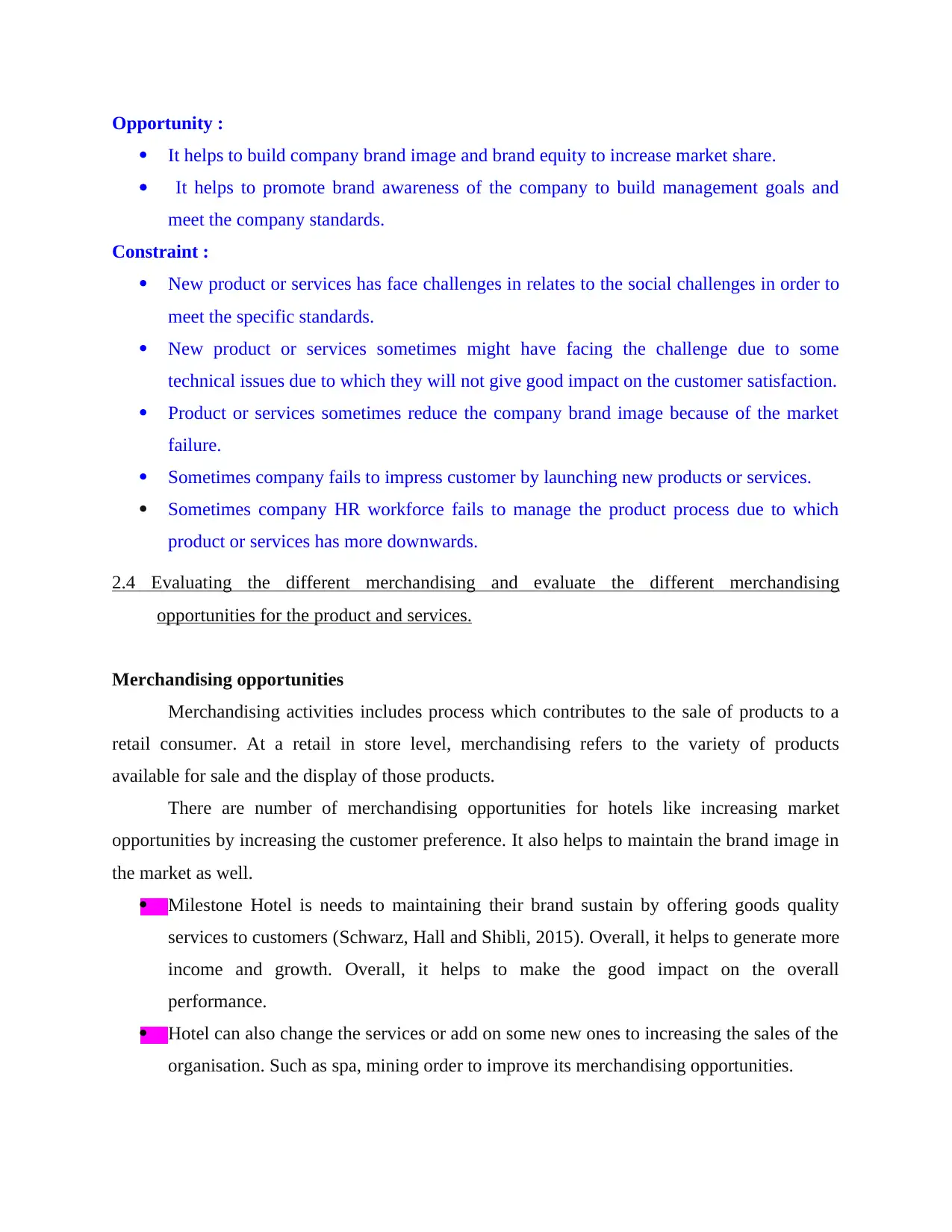
Opportunity :
It helps to build company brand image and brand equity to increase market share.
It helps to promote brand awareness of the company to build management goals and
meet the company standards.
Constraint :
New product or services has face challenges in relates to the social challenges in order to
meet the specific standards.
New product or services sometimes might have facing the challenge due to some
technical issues due to which they will not give good impact on the customer satisfaction.
Product or services sometimes reduce the company brand image because of the market
failure.
Sometimes company fails to impress customer by launching new products or services.
Sometimes company HR workforce fails to manage the product process due to which
product or services has more downwards.
2.4 Evaluating the different merchandising and evaluate the different merchandising
opportunities for the product and services.
Merchandising opportunities
Merchandising activities includes process which contributes to the sale of products to a
retail consumer. At a retail in store level, merchandising refers to the variety of products
available for sale and the display of those products.
There are number of merchandising opportunities for hotels like increasing market
opportunities by increasing the customer preference. It also helps to maintain the brand image in
the market as well.
Milestone Hotel is needs to maintaining their brand sustain by offering goods quality
services to customers (Schwarz, Hall and Shibli, 2015). Overall, it helps to generate more
income and growth. Overall, it helps to make the good impact on the overall
performance.
Hotel can also change the services or add on some new ones to increasing the sales of the
organisation. Such as spa, mining order to improve its merchandising opportunities.
It helps to build company brand image and brand equity to increase market share.
It helps to promote brand awareness of the company to build management goals and
meet the company standards.
Constraint :
New product or services has face challenges in relates to the social challenges in order to
meet the specific standards.
New product or services sometimes might have facing the challenge due to some
technical issues due to which they will not give good impact on the customer satisfaction.
Product or services sometimes reduce the company brand image because of the market
failure.
Sometimes company fails to impress customer by launching new products or services.
Sometimes company HR workforce fails to manage the product process due to which
product or services has more downwards.
2.4 Evaluating the different merchandising and evaluate the different merchandising
opportunities for the product and services.
Merchandising opportunities
Merchandising activities includes process which contributes to the sale of products to a
retail consumer. At a retail in store level, merchandising refers to the variety of products
available for sale and the display of those products.
There are number of merchandising opportunities for hotels like increasing market
opportunities by increasing the customer preference. It also helps to maintain the brand image in
the market as well.
Milestone Hotel is needs to maintaining their brand sustain by offering goods quality
services to customers (Schwarz, Hall and Shibli, 2015). Overall, it helps to generate more
income and growth. Overall, it helps to make the good impact on the overall
performance.
Hotel can also change the services or add on some new ones to increasing the sales of the
organisation. Such as spa, mining order to improve its merchandising opportunities.
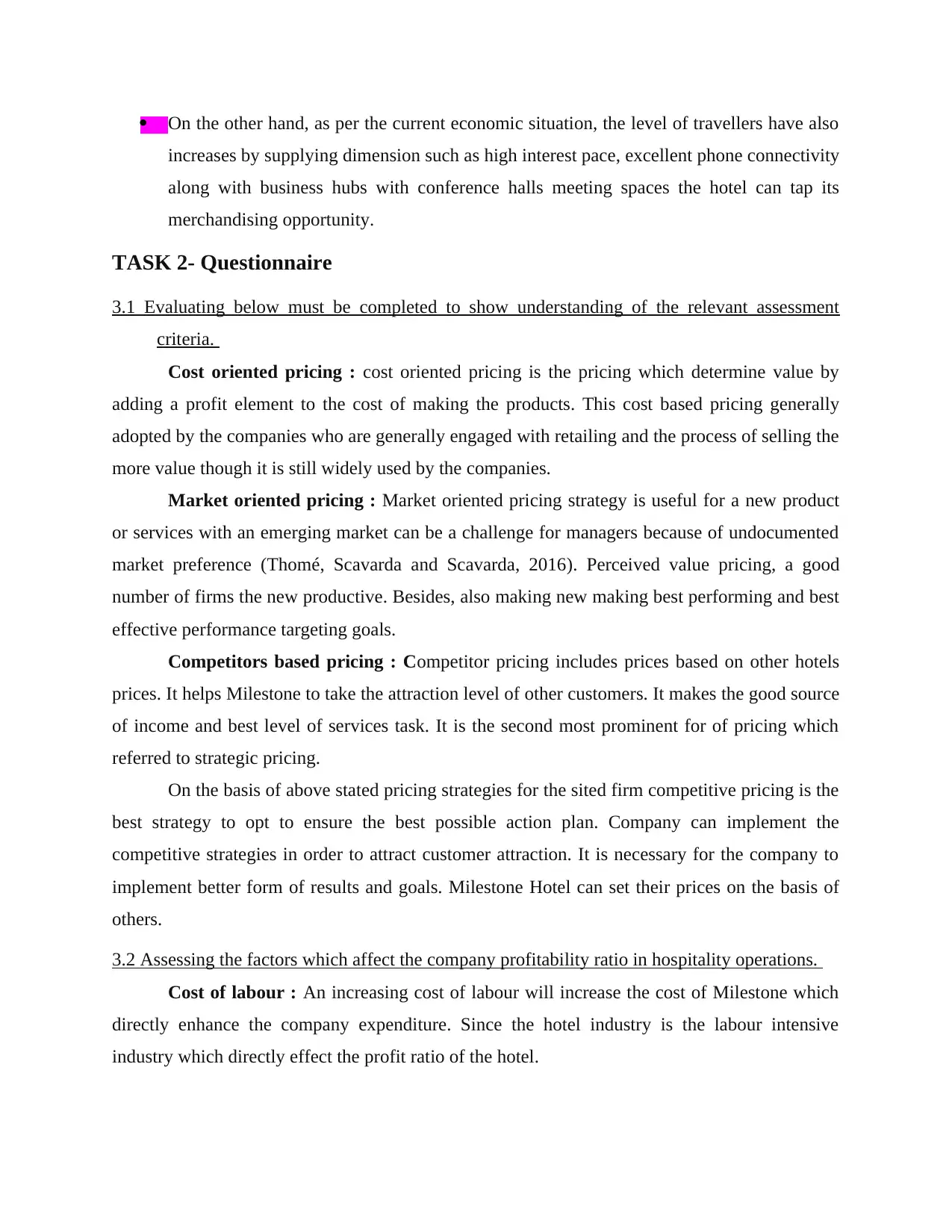
On the other hand, as per the current economic situation, the level of travellers have also
increases by supplying dimension such as high interest pace, excellent phone connectivity
along with business hubs with conference halls meeting spaces the hotel can tap its
merchandising opportunity.
TASK 2- Questionnaire
3.1 Evaluating below must be completed to show understanding of the relevant assessment
criteria.
Cost oriented pricing : cost oriented pricing is the pricing which determine value by
adding a profit element to the cost of making the products. This cost based pricing generally
adopted by the companies who are generally engaged with retailing and the process of selling the
more value though it is still widely used by the companies.
Market oriented pricing : Market oriented pricing strategy is useful for a new product
or services with an emerging market can be a challenge for managers because of undocumented
market preference (Thomé, Scavarda and Scavarda, 2016). Perceived value pricing, a good
number of firms the new productive. Besides, also making new making best performing and best
effective performance targeting goals.
Competitors based pricing : Competitor pricing includes prices based on other hotels
prices. It helps Milestone to take the attraction level of other customers. It makes the good source
of income and best level of services task. It is the second most prominent for of pricing which
referred to strategic pricing.
On the basis of above stated pricing strategies for the sited firm competitive pricing is the
best strategy to opt to ensure the best possible action plan. Company can implement the
competitive strategies in order to attract customer attraction. It is necessary for the company to
implement better form of results and goals. Milestone Hotel can set their prices on the basis of
others.
3.2 Assessing the factors which affect the company profitability ratio in hospitality operations.
Cost of labour : An increasing cost of labour will increase the cost of Milestone which
directly enhance the company expenditure. Since the hotel industry is the labour intensive
industry which directly effect the profit ratio of the hotel.
increases by supplying dimension such as high interest pace, excellent phone connectivity
along with business hubs with conference halls meeting spaces the hotel can tap its
merchandising opportunity.
TASK 2- Questionnaire
3.1 Evaluating below must be completed to show understanding of the relevant assessment
criteria.
Cost oriented pricing : cost oriented pricing is the pricing which determine value by
adding a profit element to the cost of making the products. This cost based pricing generally
adopted by the companies who are generally engaged with retailing and the process of selling the
more value though it is still widely used by the companies.
Market oriented pricing : Market oriented pricing strategy is useful for a new product
or services with an emerging market can be a challenge for managers because of undocumented
market preference (Thomé, Scavarda and Scavarda, 2016). Perceived value pricing, a good
number of firms the new productive. Besides, also making new making best performing and best
effective performance targeting goals.
Competitors based pricing : Competitor pricing includes prices based on other hotels
prices. It helps Milestone to take the attraction level of other customers. It makes the good source
of income and best level of services task. It is the second most prominent for of pricing which
referred to strategic pricing.
On the basis of above stated pricing strategies for the sited firm competitive pricing is the
best strategy to opt to ensure the best possible action plan. Company can implement the
competitive strategies in order to attract customer attraction. It is necessary for the company to
implement better form of results and goals. Milestone Hotel can set their prices on the basis of
others.
3.2 Assessing the factors which affect the company profitability ratio in hospitality operations.
Cost of labour : An increasing cost of labour will increase the cost of Milestone which
directly enhance the company expenditure. Since the hotel industry is the labour intensive
industry which directly effect the profit ratio of the hotel.
Secure Best Marks with AI Grader
Need help grading? Try our AI Grader for instant feedback on your assignments.
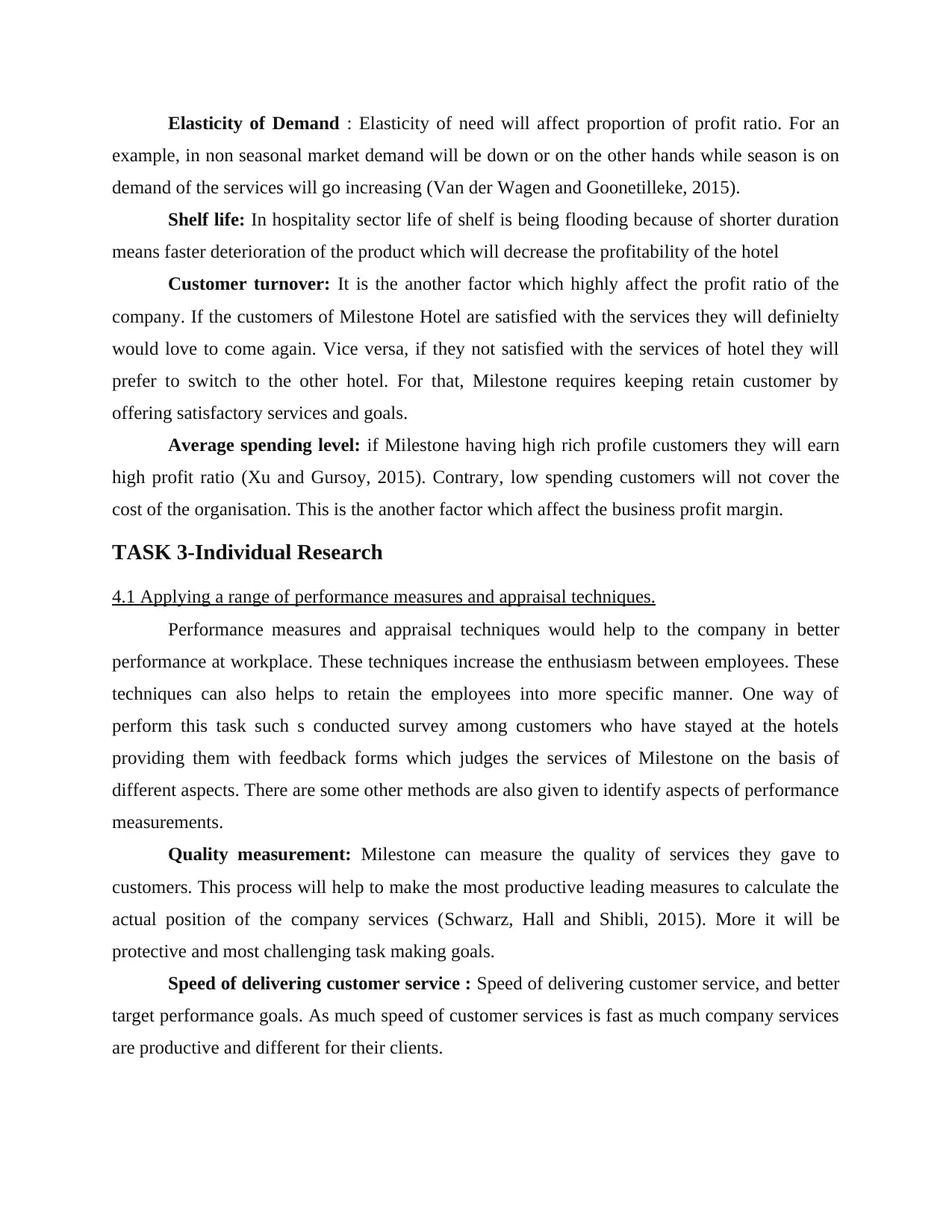
Elasticity of Demand : Elasticity of need will affect proportion of profit ratio. For an
example, in non seasonal market demand will be down or on the other hands while season is on
demand of the services will go increasing (Van der Wagen and Goonetilleke, 2015).
Shelf life: In hospitality sector life of shelf is being flooding because of shorter duration
means faster deterioration of the product which will decrease the profitability of the hotel
Customer turnover: It is the another factor which highly affect the profit ratio of the
company. If the customers of Milestone Hotel are satisfied with the services they will definielty
would love to come again. Vice versa, if they not satisfied with the services of hotel they will
prefer to switch to the other hotel. For that, Milestone requires keeping retain customer by
offering satisfactory services and goals.
Average spending level: if Milestone having high rich profile customers they will earn
high profit ratio (Xu and Gursoy, 2015). Contrary, low spending customers will not cover the
cost of the organisation. This is the another factor which affect the business profit margin.
TASK 3-Individual Research
4.1 Applying a range of performance measures and appraisal techniques.
Performance measures and appraisal techniques would help to the company in better
performance at workplace. These techniques increase the enthusiasm between employees. These
techniques can also helps to retain the employees into more specific manner. One way of
perform this task such s conducted survey among customers who have stayed at the hotels
providing them with feedback forms which judges the services of Milestone on the basis of
different aspects. There are some other methods are also given to identify aspects of performance
measurements.
Quality measurement: Milestone can measure the quality of services they gave to
customers. This process will help to make the most productive leading measures to calculate the
actual position of the company services (Schwarz, Hall and Shibli, 2015). More it will be
protective and most challenging task making goals.
Speed of delivering customer service : Speed of delivering customer service, and better
target performance goals. As much speed of customer services is fast as much company services
are productive and different for their clients.
example, in non seasonal market demand will be down or on the other hands while season is on
demand of the services will go increasing (Van der Wagen and Goonetilleke, 2015).
Shelf life: In hospitality sector life of shelf is being flooding because of shorter duration
means faster deterioration of the product which will decrease the profitability of the hotel
Customer turnover: It is the another factor which highly affect the profit ratio of the
company. If the customers of Milestone Hotel are satisfied with the services they will definielty
would love to come again. Vice versa, if they not satisfied with the services of hotel they will
prefer to switch to the other hotel. For that, Milestone requires keeping retain customer by
offering satisfactory services and goals.
Average spending level: if Milestone having high rich profile customers they will earn
high profit ratio (Xu and Gursoy, 2015). Contrary, low spending customers will not cover the
cost of the organisation. This is the another factor which affect the business profit margin.
TASK 3-Individual Research
4.1 Applying a range of performance measures and appraisal techniques.
Performance measures and appraisal techniques would help to the company in better
performance at workplace. These techniques increase the enthusiasm between employees. These
techniques can also helps to retain the employees into more specific manner. One way of
perform this task such s conducted survey among customers who have stayed at the hotels
providing them with feedback forms which judges the services of Milestone on the basis of
different aspects. There are some other methods are also given to identify aspects of performance
measurements.
Quality measurement: Milestone can measure the quality of services they gave to
customers. This process will help to make the most productive leading measures to calculate the
actual position of the company services (Schwarz, Hall and Shibli, 2015). More it will be
protective and most challenging task making goals.
Speed of delivering customer service : Speed of delivering customer service, and better
target performance goals. As much speed of customer services is fast as much company services
are productive and different for their clients.
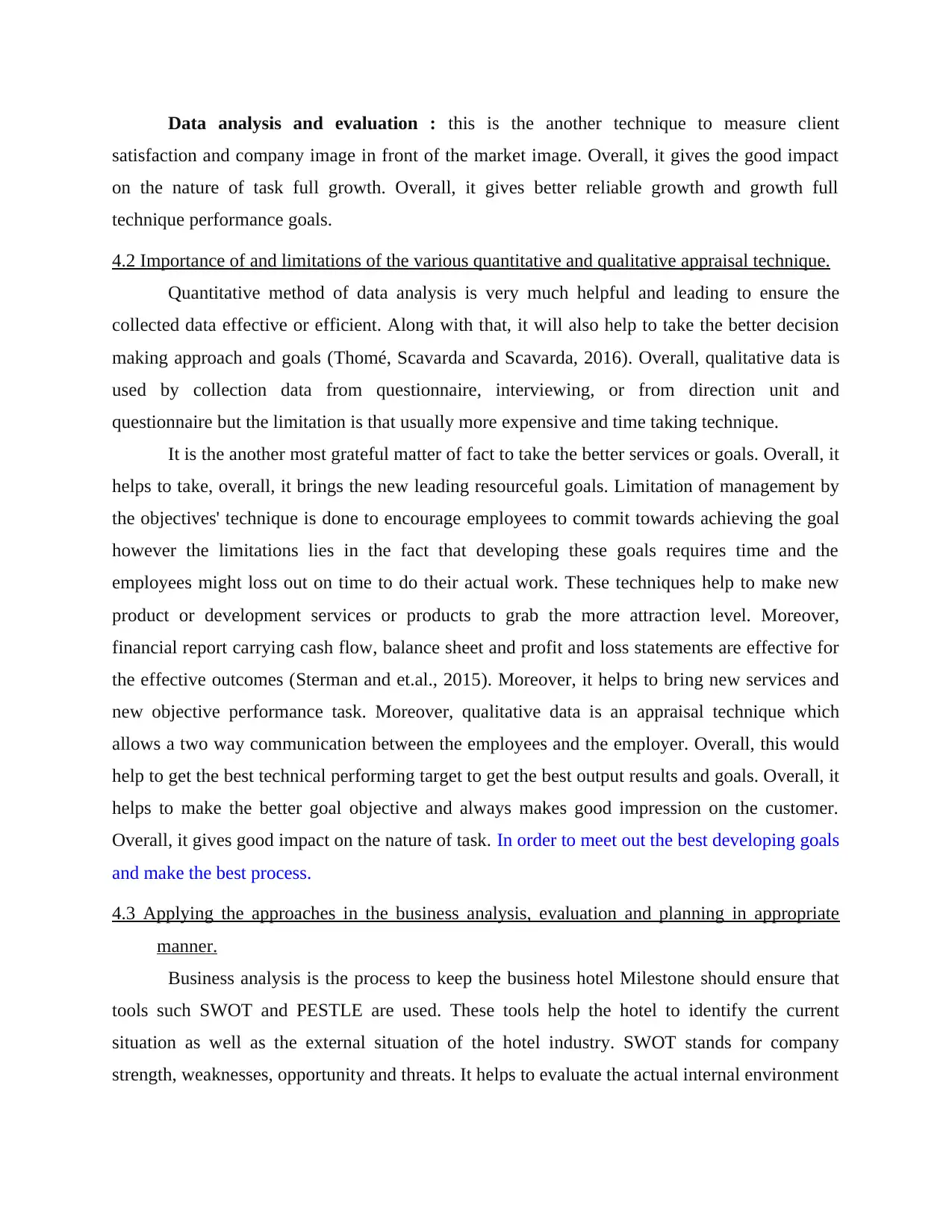
Data analysis and evaluation : this is the another technique to measure client
satisfaction and company image in front of the market image. Overall, it gives the good impact
on the nature of task full growth. Overall, it gives better reliable growth and growth full
technique performance goals.
4.2 Importance of and limitations of the various quantitative and qualitative appraisal technique.
Quantitative method of data analysis is very much helpful and leading to ensure the
collected data effective or efficient. Along with that, it will also help to take the better decision
making approach and goals (Thomé, Scavarda and Scavarda, 2016). Overall, qualitative data is
used by collection data from questionnaire, interviewing, or from direction unit and
questionnaire but the limitation is that usually more expensive and time taking technique.
It is the another most grateful matter of fact to take the better services or goals. Overall, it
helps to take, overall, it brings the new leading resourceful goals. Limitation of management by
the objectives' technique is done to encourage employees to commit towards achieving the goal
however the limitations lies in the fact that developing these goals requires time and the
employees might loss out on time to do their actual work. These techniques help to make new
product or development services or products to grab the more attraction level. Moreover,
financial report carrying cash flow, balance sheet and profit and loss statements are effective for
the effective outcomes (Sterman and et.al., 2015). Moreover, it helps to bring new services and
new objective performance task. Moreover, qualitative data is an appraisal technique which
allows a two way communication between the employees and the employer. Overall, this would
help to get the best technical performing target to get the best output results and goals. Overall, it
helps to make the better goal objective and always makes good impression on the customer.
Overall, it gives good impact on the nature of task. In order to meet out the best developing goals
and make the best process.
4.3 Applying the approaches in the business analysis, evaluation and planning in appropriate
manner.
Business analysis is the process to keep the business hotel Milestone should ensure that
tools such SWOT and PESTLE are used. These tools help the hotel to identify the current
situation as well as the external situation of the hotel industry. SWOT stands for company
strength, weaknesses, opportunity and threats. It helps to evaluate the actual internal environment
satisfaction and company image in front of the market image. Overall, it gives the good impact
on the nature of task full growth. Overall, it gives better reliable growth and growth full
technique performance goals.
4.2 Importance of and limitations of the various quantitative and qualitative appraisal technique.
Quantitative method of data analysis is very much helpful and leading to ensure the
collected data effective or efficient. Along with that, it will also help to take the better decision
making approach and goals (Thomé, Scavarda and Scavarda, 2016). Overall, qualitative data is
used by collection data from questionnaire, interviewing, or from direction unit and
questionnaire but the limitation is that usually more expensive and time taking technique.
It is the another most grateful matter of fact to take the better services or goals. Overall, it
helps to take, overall, it brings the new leading resourceful goals. Limitation of management by
the objectives' technique is done to encourage employees to commit towards achieving the goal
however the limitations lies in the fact that developing these goals requires time and the
employees might loss out on time to do their actual work. These techniques help to make new
product or development services or products to grab the more attraction level. Moreover,
financial report carrying cash flow, balance sheet and profit and loss statements are effective for
the effective outcomes (Sterman and et.al., 2015). Moreover, it helps to bring new services and
new objective performance task. Moreover, qualitative data is an appraisal technique which
allows a two way communication between the employees and the employer. Overall, this would
help to get the best technical performing target to get the best output results and goals. Overall, it
helps to make the better goal objective and always makes good impression on the customer.
Overall, it gives good impact on the nature of task. In order to meet out the best developing goals
and make the best process.
4.3 Applying the approaches in the business analysis, evaluation and planning in appropriate
manner.
Business analysis is the process to keep the business hotel Milestone should ensure that
tools such SWOT and PESTLE are used. These tools help the hotel to identify the current
situation as well as the external situation of the hotel industry. SWOT stands for company
strength, weaknesses, opportunity and threats. It helps to evaluate the actual internal environment
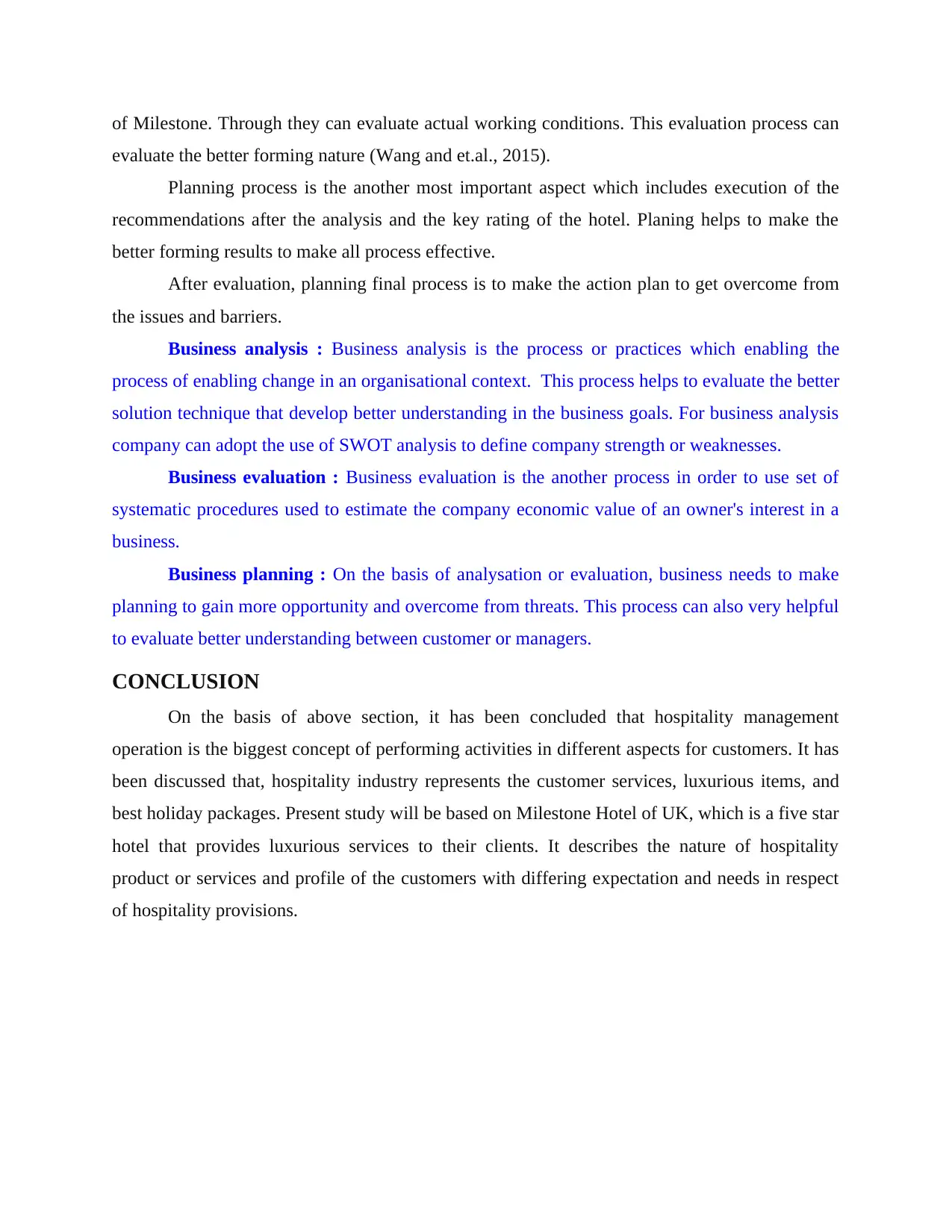
of Milestone. Through they can evaluate actual working conditions. This evaluation process can
evaluate the better forming nature (Wang and et.al., 2015).
Planning process is the another most important aspect which includes execution of the
recommendations after the analysis and the key rating of the hotel. Planing helps to make the
better forming results to make all process effective.
After evaluation, planning final process is to make the action plan to get overcome from
the issues and barriers.
Business analysis : Business analysis is the process or practices which enabling the
process of enabling change in an organisational context. This process helps to evaluate the better
solution technique that develop better understanding in the business goals. For business analysis
company can adopt the use of SWOT analysis to define company strength or weaknesses.
Business evaluation : Business evaluation is the another process in order to use set of
systematic procedures used to estimate the company economic value of an owner's interest in a
business.
Business planning : On the basis of analysation or evaluation, business needs to make
planning to gain more opportunity and overcome from threats. This process can also very helpful
to evaluate better understanding between customer or managers.
CONCLUSION
On the basis of above section, it has been concluded that hospitality management
operation is the biggest concept of performing activities in different aspects for customers. It has
been discussed that, hospitality industry represents the customer services, luxurious items, and
best holiday packages. Present study will be based on Milestone Hotel of UK, which is a five star
hotel that provides luxurious services to their clients. It describes the nature of hospitality
product or services and profile of the customers with differing expectation and needs in respect
of hospitality provisions.
evaluate the better forming nature (Wang and et.al., 2015).
Planning process is the another most important aspect which includes execution of the
recommendations after the analysis and the key rating of the hotel. Planing helps to make the
better forming results to make all process effective.
After evaluation, planning final process is to make the action plan to get overcome from
the issues and barriers.
Business analysis : Business analysis is the process or practices which enabling the
process of enabling change in an organisational context. This process helps to evaluate the better
solution technique that develop better understanding in the business goals. For business analysis
company can adopt the use of SWOT analysis to define company strength or weaknesses.
Business evaluation : Business evaluation is the another process in order to use set of
systematic procedures used to estimate the company economic value of an owner's interest in a
business.
Business planning : On the basis of analysation or evaluation, business needs to make
planning to gain more opportunity and overcome from threats. This process can also very helpful
to evaluate better understanding between customer or managers.
CONCLUSION
On the basis of above section, it has been concluded that hospitality management
operation is the biggest concept of performing activities in different aspects for customers. It has
been discussed that, hospitality industry represents the customer services, luxurious items, and
best holiday packages. Present study will be based on Milestone Hotel of UK, which is a five star
hotel that provides luxurious services to their clients. It describes the nature of hospitality
product or services and profile of the customers with differing expectation and needs in respect
of hospitality provisions.
Paraphrase This Document
Need a fresh take? Get an instant paraphrase of this document with our AI Paraphraser
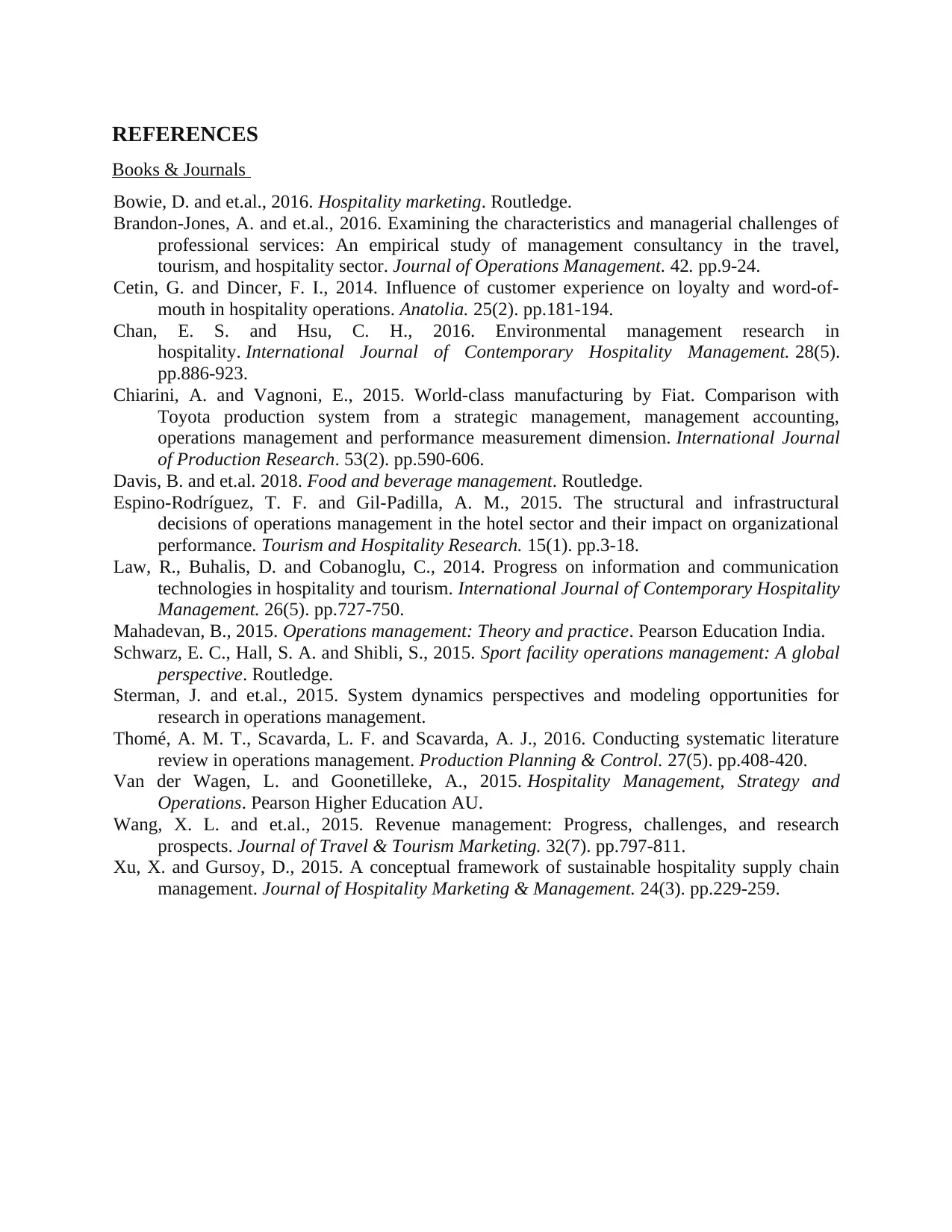
REFERENCES
Books & Journals
Bowie, D. and et.al., 2016. Hospitality marketing. Routledge.
Brandon-Jones, A. and et.al., 2016. Examining the characteristics and managerial challenges of
professional services: An empirical study of management consultancy in the travel,
tourism, and hospitality sector. Journal of Operations Management. 42. pp.9-24.
Cetin, G. and Dincer, F. I., 2014. Influence of customer experience on loyalty and word-of-
mouth in hospitality operations. Anatolia. 25(2). pp.181-194.
Chan, E. S. and Hsu, C. H., 2016. Environmental management research in
hospitality. International Journal of Contemporary Hospitality Management. 28(5).
pp.886-923.
Chiarini, A. and Vagnoni, E., 2015. World-class manufacturing by Fiat. Comparison with
Toyota production system from a strategic management, management accounting,
operations management and performance measurement dimension. International Journal
of Production Research. 53(2). pp.590-606.
Davis, B. and et.al. 2018. Food and beverage management. Routledge.
Espino-Rodríguez, T. F. and Gil-Padilla, A. M., 2015. The structural and infrastructural
decisions of operations management in the hotel sector and their impact on organizational
performance. Tourism and Hospitality Research. 15(1). pp.3-18.
Law, R., Buhalis, D. and Cobanoglu, C., 2014. Progress on information and communication
technologies in hospitality and tourism. International Journal of Contemporary Hospitality
Management. 26(5). pp.727-750.
Mahadevan, B., 2015. Operations management: Theory and practice. Pearson Education India.
Schwarz, E. C., Hall, S. A. and Shibli, S., 2015. Sport facility operations management: A global
perspective. Routledge.
Sterman, J. and et.al., 2015. System dynamics perspectives and modeling opportunities for
research in operations management.
Thomé, A. M. T., Scavarda, L. F. and Scavarda, A. J., 2016. Conducting systematic literature
review in operations management. Production Planning & Control. 27(5). pp.408-420.
Van der Wagen, L. and Goonetilleke, A., 2015. Hospitality Management, Strategy and
Operations. Pearson Higher Education AU.
Wang, X. L. and et.al., 2015. Revenue management: Progress, challenges, and research
prospects. Journal of Travel & Tourism Marketing. 32(7). pp.797-811.
Xu, X. and Gursoy, D., 2015. A conceptual framework of sustainable hospitality supply chain
management. Journal of Hospitality Marketing & Management. 24(3). pp.229-259.
Books & Journals
Bowie, D. and et.al., 2016. Hospitality marketing. Routledge.
Brandon-Jones, A. and et.al., 2016. Examining the characteristics and managerial challenges of
professional services: An empirical study of management consultancy in the travel,
tourism, and hospitality sector. Journal of Operations Management. 42. pp.9-24.
Cetin, G. and Dincer, F. I., 2014. Influence of customer experience on loyalty and word-of-
mouth in hospitality operations. Anatolia. 25(2). pp.181-194.
Chan, E. S. and Hsu, C. H., 2016. Environmental management research in
hospitality. International Journal of Contemporary Hospitality Management. 28(5).
pp.886-923.
Chiarini, A. and Vagnoni, E., 2015. World-class manufacturing by Fiat. Comparison with
Toyota production system from a strategic management, management accounting,
operations management and performance measurement dimension. International Journal
of Production Research. 53(2). pp.590-606.
Davis, B. and et.al. 2018. Food and beverage management. Routledge.
Espino-Rodríguez, T. F. and Gil-Padilla, A. M., 2015. The structural and infrastructural
decisions of operations management in the hotel sector and their impact on organizational
performance. Tourism and Hospitality Research. 15(1). pp.3-18.
Law, R., Buhalis, D. and Cobanoglu, C., 2014. Progress on information and communication
technologies in hospitality and tourism. International Journal of Contemporary Hospitality
Management. 26(5). pp.727-750.
Mahadevan, B., 2015. Operations management: Theory and practice. Pearson Education India.
Schwarz, E. C., Hall, S. A. and Shibli, S., 2015. Sport facility operations management: A global
perspective. Routledge.
Sterman, J. and et.al., 2015. System dynamics perspectives and modeling opportunities for
research in operations management.
Thomé, A. M. T., Scavarda, L. F. and Scavarda, A. J., 2016. Conducting systematic literature
review in operations management. Production Planning & Control. 27(5). pp.408-420.
Van der Wagen, L. and Goonetilleke, A., 2015. Hospitality Management, Strategy and
Operations. Pearson Higher Education AU.
Wang, X. L. and et.al., 2015. Revenue management: Progress, challenges, and research
prospects. Journal of Travel & Tourism Marketing. 32(7). pp.797-811.
Xu, X. and Gursoy, D., 2015. A conceptual framework of sustainable hospitality supply chain
management. Journal of Hospitality Marketing & Management. 24(3). pp.229-259.
1 out of 14
Related Documents
Your All-in-One AI-Powered Toolkit for Academic Success.
+13062052269
info@desklib.com
Available 24*7 on WhatsApp / Email
![[object Object]](/_next/static/media/star-bottom.7253800d.svg)
Unlock your academic potential
© 2024 | Zucol Services PVT LTD | All rights reserved.





